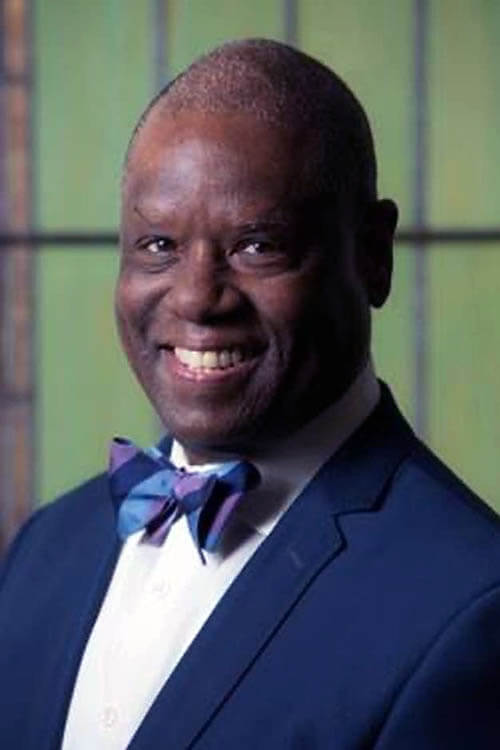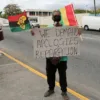Key points:
- Reparative justice offers a means for addressing the pain of racism and transforming relationships and systems.
- Diagnosing oppression begins with understanding our history, and the Black experience is grounded in the intergenerational trauma of racism.
- The formation of Ecumenical Table Talks and worship models addressing reparations has been successful in Pittsburgh and can be replicated elsewhere.
- Faith leaders can play a significant role by engaging legislative, local political, civic and educational leadership to shape economic policy.

The Rev. Larry Pickens
Photo courtesy of the author.
Commentaries
UM News publishes various commentaries about issues in the denomination. The opinion pieces reflect a variety of viewpoints and are the opinions of the writers, not the UM News staff.
Reparations is a controversial topic that has not gained a significant footing in many of our faith communities. Injecting it into our congregational discussions of theological life has been an elusive prospect.
I recently participated in a forum sponsored by The Council for World Mission titled “A Theology of Reparations: Consultation Under the Onesimus Project (TOP)” in Harare, Zimbabwe. I spoke in my capacity as the executive director of the Pennsylvania Council of Churches.
The host of our event was the Rev. Dr. Kupakwashe Mtata, principal of United Theological College. The event, held July 22-26, included more than 20 academics, theologians and ecumenical partners who addressed biblical and theological ripples of reparations, repair, restitution and justice associated with enslavement, colonialism and systemic racism.
The Onesimus Project is grounded in the biblical account of Onesimus, an enslaved man who is described in the New Testament book of Philemon. Onesimus encountered Paul as he had freed himself from bondage to Philemon.
Paul represents in his letter to Philemon that he is returning Onesimus and will pay for any present and future debts he incurs. This text, however, seems to continue to support patriarchy and enslavement, substituting Paul for Philemon with respect to Onesimus’ autonomy and decision-making.
No one seeks to ascertain Onesimus’ wishes. He lacks a voice. Paul now gets to speak for him. This encounter is not transformative and maintains the infrastructure of enslavement and a system of caste. A theology of reparations, however, represents reparative justice through which relationships and systems are transformed.
The diagnosis of oppression begins with understanding our history, what has happened to us individually and as a nation. The Black experience is grounded in the intergenerational trauma and pain of racism.
Isabel Wilkerson suggests that addressing our caste history is like undergoing a medical examination for treatment. We must understand that history and apply it as we develop a treatment plan. Treating the multigenerational damage caused by racism and caste is the foundation of restorative justice.
My presentation theme was, “A Theology of Reparations: Addressing Multigenerational Trauma and Creating a Framework for Restorative and Reparative Justice.” In his book My Grandmother’s Hands, author Resmaa Menakem asserts that Black people have developed, over many generations, body-centered responses to trauma that blunt the effects of racism and white supremacy.
“The Black religious experience is a spiritual response to trauma that involves a body-centered worship encounter where the response of the faithful includes individual and collective humming, rocking, rhythmic clapping, drumming, singing, grounding touch, wailing circles, and call and response.” The Black Spirituals were body-centered responses designed to help settle enslaved people as they sought to salve the effects of their socialized trauma.
During my presentation, I shared a story that relates to my Nigerian Ibo ancestry. In 1803, enslaved Ibo persons took control of a slave ship at Dunbar Creek, located at St. Simons Island, Georgia. In an act of defiance, 10 of the enslaved intentionally drowned themselves to escape slavery, giving meaning to the spiritual “Oh, Freedom:”
Oh, freedom,
Oh, freedom over me
And before I’d be a slave
I’d be buried in my grave
And go home to my Lord and be free.
Black people share a history of both trauma and resiliency in the United States. Succeeding generations of Black people carry this history of trauma that began with our enslavement, continued through Jim Crow segregation and still plagues or reality today.
Addressing multigenerational trauma requires a reparative process in which our faith communities reject white supremacy and the “othering” of people because of the color of their skin, gender, sexual orientation, immigration status or any other characteristic that we use to separate and isolate other people. It is a call to see people not as scapegoats poised to take something from us, but as neighbors.
Subscribe to our
e-newsletter
Like what you’re reading and want to see more? Sign up for our free daily and weekly digests of important news and events in the life of The United Methodist Church.
My presentation also included tangible efforts taking place in the United States that are designed to provide reparative justice for Black people. One such project includes an effort in which the Pennsylvania Council of Churches has been engaged. James Baldwin once said that “urban renewal meant negro removal.”
Sharing our experience at the Pennsylvania Council of Churches includes work that we have done with Bethel African Methodist Episcopal Church, established in 1808. The church has a long history of significant ministry in the African American community of Pittsburgh.
In 1957, Bethel AME Church was demolished by the city of Pittsburgh as a part of urban renewal after city authorities identified the church building as blight within the Lower Hill District of Pittsburgh. At the time, the congregation received $240,000 in compensation for the eminent domain taking of its church building, which was part of redevelopment in the area.
Bethel AME Church was victimized by the legal taking and did not receive adequate compensation. This area has now been developed to include multimillion-dollar structures, which also displaced Black families while creating housing and business infrastructure from which African American communities have not benefitted. In fact, the congregation and its people were relegated to a segregated area of the city that is bereft of quality schools, services and economic development capacity.
Addressing this historical wrong has brought together ecumenical leadership, business and community members and legal scholars who embrace the practical application of reparations as we build new relationships of hopefulness between the Pittsburgh community and the African Methodist Episcopal Church.
The effort has allowed for the formation of Ecumenical Table Talks and ecumenical worship models for addressing reparations. This example can be replicated in a global and ecumenical context.
Practical assistance was provided by law students at Duquesne University Law School; these students authored a white paper outlining the legal rights of Bethel Church. There were also significant conversations with civic leaders and the Pittsburgh Penguins Hockey Club, which holds the development rights to the property where the church previously existed.
Bethel African Methodist Episcopal Church has been central in creating a reconstituted ecumenical movement within the Commonwealth of Pennsylvania.
It took 65 years for significant conversations to take place in a substantive way, involving city and local leadership. Although in most cases justice delayed is justice denied, something different happened in our context. It became clear to our community that reparations are a call to justice and repair that brings people together as we redress what history has overlooked.
Bethel’s efforts, inclusive of ecumenical and interfaith engagement, led to a historic agreement with the Pittsburgh Penguins for the church to use a 1.5-acre piece of land near the congregation’s former site to develop affordable housing and economic initiatives.
People of faith have a role to play in healing our land and creating an environment in which community is built. Finding human dignity in all of God’s people and working toward justice is the beginning of this repair.
Pickens is executive director of the Pennsylvania Council of Churches in Harrisburg, Pennsylvania.
News media contact: Tim Tanton or Joey Butler at (615) 742-5470 or [email protected]. To read more United Methodist news, subscribe to the free Daily or Weekly Digests.


